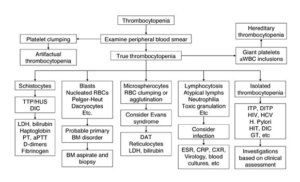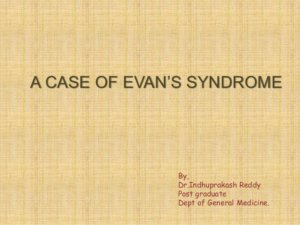Evans syndrome is a very rare autoimmune disorder in which the body makes antibodies that destroy the red blood cells, platelets and white blood cells. Affected individuals usually experience thrombocytopenia (too few platelets) and Coombs’ positive hemolytic anemia (premature destruction of red blood cells). People with Evans syndrome may have low levels of all three types of blood cells at one time, or may only have problems with one or two of them. The exact cause of this condition is unknown. FOLLOWING IS from Boston Children’s Blood Disorder Center.
 Algorithm for workup of thrombocytopenia based on observation of the peripheral blood film. Captured from www.GrepMed.com
Algorithm for workup of thrombocytopenia based on observation of the peripheral blood film. Captured from www.GrepMed.com
SYMPTOMS and DIAGNOSIS
The symptoms of Evans syndrome may be similar in nature to leukemia and lymphoma, so those illnesses must be ruled out before a diagnosis is made. If a child has a low RBC count, symptoms may include:
- Jaundice
- Dark Brown Urine
- Pale Skin
- Weakness
- Fatigue
- Shortness of breath
If a child has a low platelet count, symptoms may include:
- Increased bruising
- Petechia – tiny red dots under the skin that are a result of very small bleeds into the skin
- Increased bleeding symptoms, such as a bloody nose or heavy menses
If a child has a low neutrophil count, symptoms may include:
- Fevers
- Mouth sores
- Increased bacterial infections

Doctors diagnose Evans syndrome with a variety of blood tests, including:
* Complete blood count
* Coombs test – a blood test that identifies the cause of anemia
* Reticulocyte count – a blood test that measures how fast new red blood cells called reticulocytes are made by bone marrow and released into the blood
Other tests may include bone marrow aspiration and biopsy and flow cytometry, a technique for identifying and sorting cells by staining with a fluorescent dye. After all tests are completed, doctors will be able to outline the best treatment options.
TREATMENT
The first-line treatments for Evan’s syndrome are corticosteroid, such as prednisone, and intravenous immunoglobulin, which help to control acute episodes. Most children respond to this treatment, but relapses frequently occur. Other treatments include:
- Immunosuppressive drugs such as 6-mercaptopurine and mycophenolate mofetil
- Removal of the spleen to improve blood counts, which may be short-lived
- Rituximab – a monoclonal antibody
- Stem cell transplant – for severe, difficult-to-treat cases and the best chance for a long-term cure
https://www.verywellhealth.com/evans-syndrome-4011862
NATURAL MEDICINE
corticosteroid, such as prednisone – known to cause liver damage, for this reason alone, Dr.’s will look to alternative medicine. Here are some links to start your journey.
https://pdsa.org/treatments/complementary/herbal-remedies.html
We use many Mexico doctors, surgery centers, cancer treatment centers and stem cell laboratories. Here is one for stem cell information.
Health Disclaimer. … If you or any other person has a medical concern, you should consult with your health care provider or seek other professional medical treatment. Never disregard professional medical advice or delay in seeking it because of something that have read on this blog or in any linked materials. The Author of this blog is a Board Certified Doctor of Natural Medicine aka: Traditional Naturopath. She does NOT diagnose or prescribe, rather seeks the root cause of ailments, suggesting gut cleansing regimens, provides nutritional counseling and offers a library full of resources so you can make more informed decisions regarding YOUR body.

